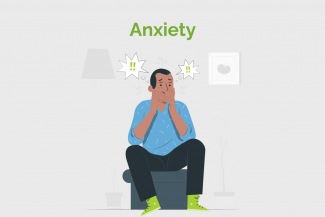
Signs and symptoms of anxiety
In moderation, anxiety isn’t always a bad thing. In fact, anxiety can help you stay alert and focused, spur you to action, and motivate you to solve problems. But when anxiety is constant or overwhelming, when it interferes with your relationships and activities, it stops being functional - that’s when you’ve crossed the line from normal, productive anxiety into the territory of anxiety disorders.
Anxiety disorders are a group of related conditions rather than a single disorder, which look very different from person to person. Despite their different forms, all anxiety disorders share one major symptom: persistent or severe fear or worry in situations where most people wouldn’t feel threatened.
Emotional symptoms of anxiety: In addition to the primary symptoms of irrational and excessive fear and worry, other common emotional symptoms of anxiety includes following-
- Feelings of apprehension
- Trouble concentrating
- Feeling tense and jumpy
- Anticipating the worst
- Irritability
- Restlessness
- Watching for signs of danger
- Feeling like your mind’s gone blank
Physical symptoms of anxiety: Common physical symptoms of anxiety include:
- Pounding heart
- Sweating
- Stomach upset or dizziness
- Frequent urination or diarrhea
- Shortness of breath
- Tremors
- Muscle tension
- Headaches
- Fatigue
- Insomnia

















